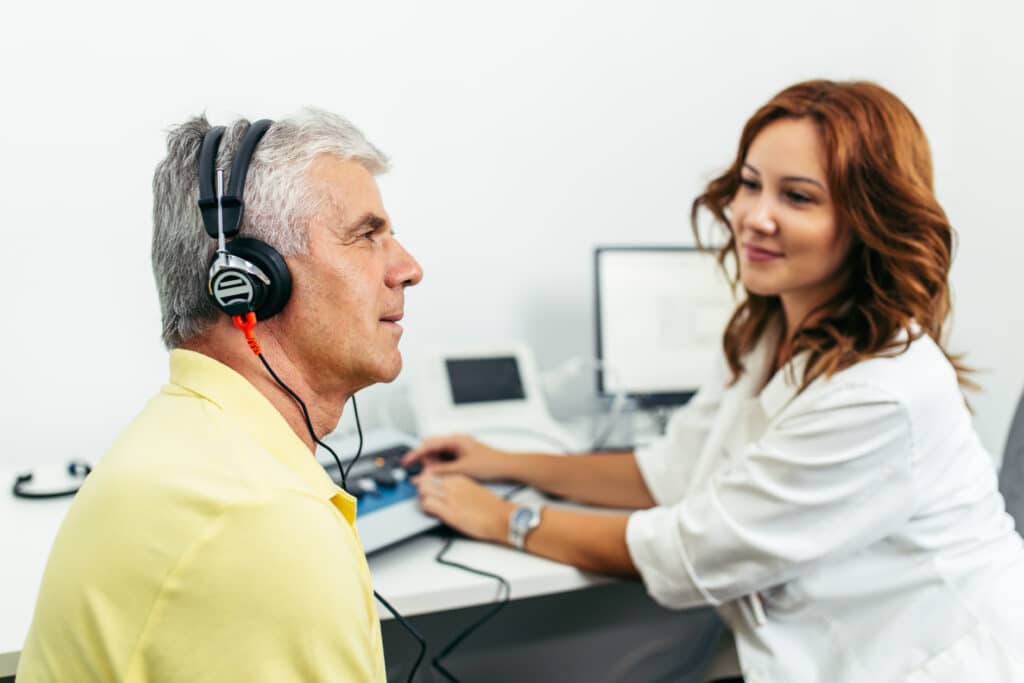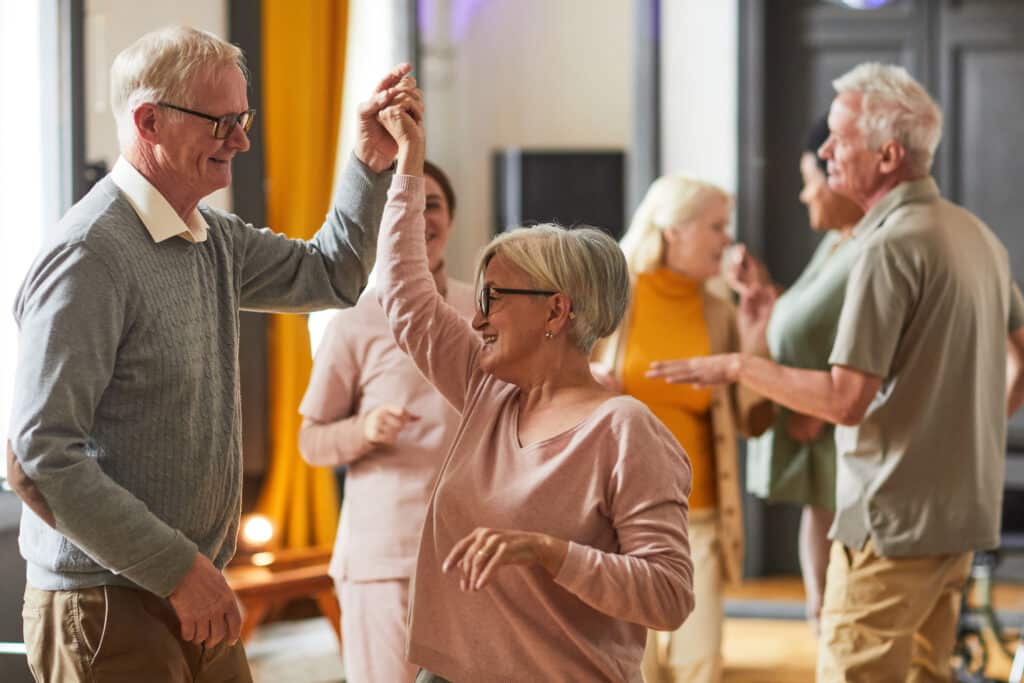Hearing loss becomes more common as we age, but it’s more than just an inconvenience—it can profoundly affect our well-being.
Hearing loss affects about one-third of individuals aged 65 to 74 and nearly half of those over 75, and it impacts more than just our ears.
Research shows a strong link between hearing loss and brain health, including the occurrence of dementia.1
Hearing loss can also lead to social isolation, increased brain strain, and faster aging. The good news is that early detection and proper management can help maintain cognitive health and quality of life.
In this article, we’ll explore how to manage hearing loss effectively. From physical therapy to everyday strategies, we’ll show you how to stay mentally sharp and connected.
Whether you’re experiencing hearing loss or caring for someone who is, understanding this issue can lead to a healthier, more connected life.
The Link Between Hearing Loss and Cognitive Decline
Cognitive decline refers to the gradual loss of thinking skills, such as memory, attention, and problem-solving, that can happen as people age. It can affect daily activities and make remembering things, making decisions, and learning new information harder.
Older adults with hearing loss are much more likely to develop dementia, one of the most potent forms of cognitive decline, than those with normal hearing.1,2
Hearing loss can lead to social isolation because people might avoid conversations to prevent frustration and embarrassment. This reduces mental stimulation, which is essential for keeping the brain active and healthy. Less mental stimulation can increase the risk of cognitive decline.
Additionally, when hearing is impaired, the brain has to work harder to process sounds. This extra effort can take away resources from other important brain functions like memory and thinking. This increased cognitive load can speed up brain aging and contribute to cognitive decline.
Social Isolation and Cognitive Decline
Hearing loss can cause social isolation, which is a key factor in cognitive decline. Social interactions are crucial for brain health because they challenge memory, language, and problem-solving skills.
When people avoid social interactions due to hearing loss, their brains get less stimulation, which can weaken cognitive abilities. Studies show that socially isolated individuals are more likely to experience faster cognitive decline and have a higher risk of conditions like Alzheimer’s disease.2
Increased Cognitive Load and Its Effect on Brain Aging
Hearing impairment also increases cognitive load. When hearing is compromised, the brain must work harder to understand sounds. This extra effort uses more cognitive resources, leaving fewer resources for other functions like memory and decision-making.
This constant strain can lead to “cognitive overload.” Over time, the brain’s continuous effort to manage hearing can speed up its aging process.
This accelerated brain aging appears as cognitive decline, where the brain’s efficiency diminishes more rapidly than in those with normal hearing.
The Role of Neuroplasticity
Neuroplasticity, the brain’s ability to reorganize itself by forming new neural connections, also plays a role.
When hearing is impaired, the brain may change structurally to compensate. This can involve shifting resources from areas like memory and thinking to support hearing.
While neuroplasticity is designed to help the brain adapt, this specific shift can reduce the brain’s overall capacity over time.
Physical Therapy’s Role in Managing Hearing Loss and Cognitive Decline

Understanding the link between hearing loss and brain health is crucial for effective treatment. Early detection and management of hearing loss can significantly reduce its impact on cognitive health.
Using hearing aids and cochlear implants can improve hearing, reduce the brain’s effort to process sounds, and help people stay socially active.
Regular hearing check-ups, especially for older adults, are essential for early identification and management of hearing loss. Combining hearing aids with activities that keep the brain engaged can help maintain cognitive health and improve quality of life.
Addressing hearing loss promptly can help maintain cognitive function and overall well-being in older adults. Your physical therapist can help; here’s how:
Holistic Assessment and Treatment Planning
Physical therapists play a key role in assessing and treating the effects of hearing loss on overall health. A thorough assessment should include checking the patient’s hearing and understanding how it affects their balance, mobility, and thinking abilities.
Using tools like the Hearing Handicap Inventory for the Elderly (HHIE) can help measure hearing loss’s social and emotional impacts.
Balance and Fall Prevention
Hearing loss can negatively affect balance which increases the risk of falls, a common concern for older adults. The inner ear helps maintain balance, and when it’s not working well, it can lead to instability and falls.
Including balance training and fall prevention exercises like tai chi and balance drills in therapy can improve stability and reduce the risk of falls. By taking measures to bolster balance skills, older adults can do their best to counter further balance challenges from conditions like hearing loss.
Cognitive Rehabilitation
Challenging your brain to manage multiple tasks at once effectively boosts cognitive abilities and mental acuity. Cognitive rehabilitation exercises can be part of physical therapy to address cognitive decline related to hearing loss.
These exercises might include memory games, problem-solving tasks, and activities that keep the mind engaged. Participating in social activities and hobbies that stimulate the mind also benefits older adults.
One effective technique in physical therapy involves dual-tasking or doing more than one task at the same time.
For example, a patient might be asked to simultaneously walk a straight line while reciting the alphabet, or they might be asked to spell their grandchildren’s names while completing a puzzle.
Collaborating with Audiologists for Comprehensive Care
Managing hearing loss and cognitive decline often requires a team approach. Working with an audiologist alongside your PT can ensure you receive complete care.
Audiologists can provide detailed hearing assessments, recommend the right hearing aids, and offer training to improve listening skills. Physical therapists can support these efforts by including recommended hearing loss management techniques in their treatment plans.
Practical Tips for Older Adults and Caregivers

Maintaining hearing and cognitive health is vital for older adults. Simple steps and regular habits can make a significant difference in improving quality of life.
Here are some practical tips to help older adults and their caregivers stay proactive in managing hearing loss and brain health:
Get Regular Hearing Check-Ups
Regular hearing check-ups can help detect hearing loss early.
Annual screenings are recommended for older adults, especially if they notice changes in their hearing or memory. Early detection can lead to timely interventions, such as fitting hearing aids or other treatments that can improve hearing and prevent further cognitive decline.
It’s also an opportunity to discuss any other hearing-related issues with your healthcare provider, ensuring comprehensive care.
Use Hearing Aids To Your Advantage
For those with hearing aids, it is important to use and maintain them properly.
You should take the time to learn how to use and care for your hearing aids to make sure they work correctly and provide the best benefit. This includes regular cleaning, checking batteries, and having periodic adjustments by an audiologist.
Proper use ensures that you are getting the most out of your hearing aids, which can greatly improve your ability to communicate and stay socially engaged.
It’s also helpful to familiarize yourself with any advanced features your hearing aids might have, such as noise reduction or Bluetooth connectivity, which can enhance your listening experience.
Stay Socially Active
Staying connected with family, friends, and peers is essential for keeping the brain healthy. Social activities provide mental stimulation that helps protect against cognitive decline. Here are some ways to stay socially active:
- Participate in Community Events: Join local events and activities that interest you, such as fairs, festivals, and workshops. These gatherings provide opportunities to meet new people and stay engaged with your community.
- Join Clubs or Groups: Joining a club or group that aligns with your interests can offer regular social interaction and a sense of belonging. Whether it’s a book club, gardening group, or senior exercise class, these activities keep you mentally and socially active.
- Engage in Group Exercise Programs: Physical activity combined with social interaction can be very beneficial. Look for group exercise classes, such as yoga, tai chi, or dance, that promote physical health and provide a social outlet.
These activities can keep your mind engaged and your social life vibrant. Staying socially active helps reduce feelings of isolation and loneliness, which are important for maintaining overall mental health and well-being.
Patient Focus: Mrs. Smith’s Journey
Mrs. Smith is an 82-year-old with a warm smile and a love for gardening. She came to our clinic struggling with moderate hearing loss and had been noticing early signs of memory issues.
Mrs. Smith found it hard to follow conversations, often feeling frustrated and left out, which made her worry about her cognitive health.
During our sessions, we saw firsthand how her hearing difficulties impacted her. Simple exercises became challenging, and understanding instructions was often a struggle. This made it hard for her to stay motivated and engaged in her therapy.
We decided to collaborate with an audiologist who fitted Mrs. Smith with hearing aids. The difference was like night and day. With her new hearing aids, Mrs. Smith’s ability to follow conversations and instructions improved dramatically.
As a result, she became more active in our sessions, her confidence grew, and her memory and overall cognitive function showed noticeable improvement.
Mrs. Smith’s story highlights the importance of addressing hearing loss. By improving her hearing, we helped her stay engaged, boost her brain health, and enhance her quality of life.
The Role of Physical Activity in Hearing Loss and Brain Health
Combining physical and mental activities can create powerful health benefits, especially for older adults. Physical exercises improve heart health, muscle strength, flexibility, and balance.
Mental exercises stimulate the brain, improving memory and problem-solving skills. Together, they promote overall well-being and help delay cognitive decline.
Dancing: A Prime Example of How Exercise Can Help

Dancing is a great activity that combines physical movement with mental coordination, social engagement, and fun! Here’s why dancing is an ideal activity to meet the needs of many older adults:
- Physical Benefits: Dancing enhances cardiovascular health, strengthens muscles, increases flexibility, and improves balance. These benefits help maintain mobility and reduce the risk of falls.
- Cognitive Engagement: Dancing requires memorizing steps and coordinating movements. This stimulates the brain, enhances memory, and improves spatial awareness.
- Social Interaction: Dancing often happens in social settings, providing opportunities for interaction. This is essential for emotional well-being and cognitive health.
- Mood Enhancement: Dancing improves mood and reduces anxiety. The combination of physical activity, mental stimulation, and social interaction releases endorphins, the body’s natural feel-good hormones.
While dancing is not the only option you need to consider, it checks several boxes for staying healthy and active with or without hearing loss. Consult with your physical therapist to find a dancing opportunity in your community.
Other Beneficial Activities
In addition to dancing, here are other activities that combine physical and mental exercises to boost brain health:
- Tai Chi: This involves slow, deliberate movements and deep breathing. It enhances balance, flexibility, and muscle strength and requires focus and mindfulness.
- Yoga combines physical postures, breathing exercises, and meditation. It improves physical fitness and mental clarity.
- Gardening: Gardening involves physical tasks like digging and planting, providing moderate exercise. It also requires planning and problem-solving.
- Interactive Games and Sports: Activities like table tennis, pickleball, and bocce ball require coordination and strategic thinking. These can be enjoyed socially.
Staying active is crucial for your health and happiness, but it’s also about having fun with people you enjoy spending time with.
You can enjoy these activities even if you have hearing loss, and in many cases, getting involved might be a simple matter of communicating your needs with the instructor or other community members so that you can feel empowered to participate.
Suggestions For Activity Leaders and Instructors
If you lead classes or activities directed at seniors who might be dealing with hearing loss, there are simple measures you can take, too.
Consider making these small adaptations to ensure seniors with hearing impairments fully benefit from activities:
- Speak slowly and clearly,
- use written instructions,
- and incorporate visual cues and hand gestures.
These adjustments can make a big difference in participation and enjoyment. If you need advice on how to adapt your classes, consult a physical therapist or audiologist.
By adapting physical and mental activities to meet the needs of those with hearing impairments, we can ensure they receive the full benefits of these exercises, enhancing overall health and quality of life.
Key Takeaways
- Hearing loss is linked to cognitive decline and dementia in older adults, so it is essential to address hearing issues promptly.
- Social isolation from hearing loss reduces mental stimulation, which is crucial for brain health, increasing the risk of cognitive decline.
- Hearing impairment forces the brain to work harder to process sounds, which can divert resources from other cognitive functions and speed up brain aging.
- Early detection and management of hearing loss through regular check-ups and interventions like hearing aids can significantly reduce its negative impact on cognitive health.
- Physical therapists play a key role in addressing the balance and cognitive functions affected by hearing loss, providing comprehensive care that includes balance training and cognitive rehabilitation exercises.
- Regular hearing check-ups and proper use of hearing aids are essential for maintaining effective hearing and overall brain health.
- Staying socially active by engaging in community events, clubs, or group exercise programs is crucial for maintaining cognitive health and preventing decline.
- Adapting physical and mental activities for hearing-impaired individuals, such as using visual cues and clear instructions, ensures full participation and maximizes the benefits of these activities.
- Collaboration with audiologists and other healthcare professionals provides comprehensive care for managing hearing loss and supporting cognitive health, leading to improved quality of life for older adults.
References
- Bowl, M. R., & Dawson, S. J. (2019). Age-related hearing loss. Cold Spring Harbor perspectives in medicine, 9(8), a033217.
- Lin, F. R., & Albert, M. (2014). Hearing loss and dementia–who is listening?. Aging & mental health, 18(6), 671-673.
- Livingston, G., Sommerlad, A., Orgeta, V., Costafreda, S. G., Huntley, J., Ames, D., … & Mukadam, N. (2017). Dementia prevention, intervention, and care. The lancet, 390(10113), 2673-2734.
- Shumway-Cook, A., & Woollacott, M. H. (2007). Motor control: translating research into clinical practice. Lippincott Williams & Wilkins.
- Campbell, J., & Sharma, A. (2013). Compensatory changes in cortical resource allocation in adults with hearing loss. Frontiers in Systems Neuroscience, 7, 65639. https://doi.org/10.3389/fnsys.2013.00071
- Campbell, J., & Sharma, A. (2013). Compensatory changes in cortical resource allocation in adults with hearing loss. Frontiers in Systems Neuroscience, 7, 65639. https://doi.org/10.3389/fnsys.2013.00071






